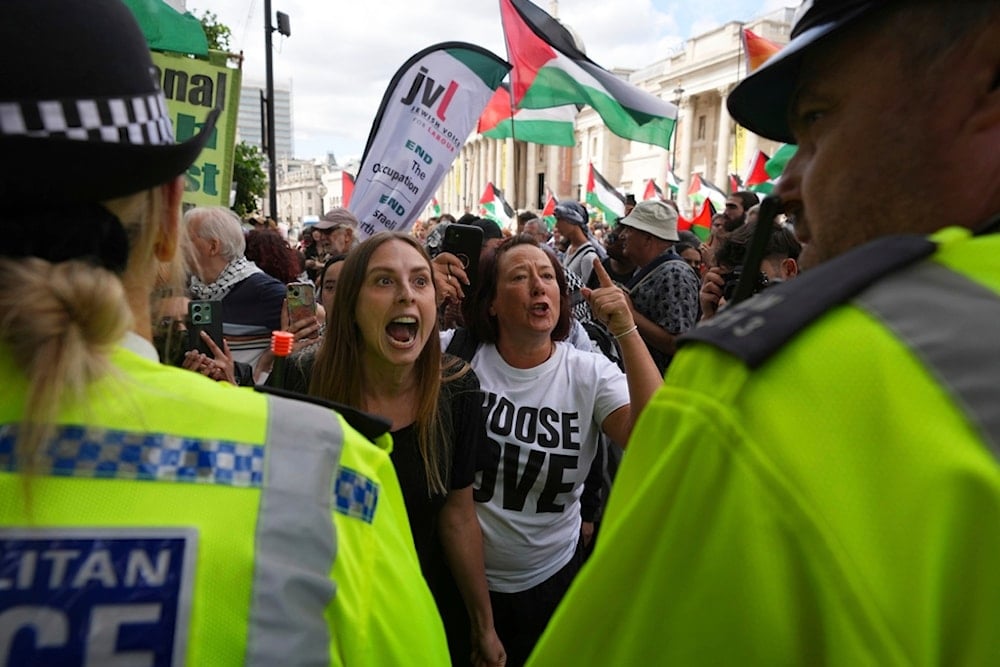UK designates Palestine Action a terrorist group
UK lawmakers ban Palestine Action as a "terrorist group" after RAF protest, sparking criticism from UN experts and activists over protest rights and free speech.
-

Demonstrators shout and gesture toward a police line during a protest by Palestine Action group in London, Monday, June 23, 2025 (AP)
British lawmakers voted on Wednesday to designate pro-Palestinian campaign group Palestine Action as a terrorist organisation, triggering widespread debate over the boundaries of protest and political repression. The decision comes after the group staged a direct action at a Royal Air Force base in southern England last month, damaging two aircraft in protest of Britain's arms trade links with the Israeli occupation.
Palestine Action, which defines itself as a direct action movement, has long targeted British companies linked to the Israeli arms industry, most notably the Israeli security firm Elbit Systems. The group has referred to Elbit as its “main target” in efforts to halt what it calls the UK’s complicity in Israeli war crimes, particularly the genocide in Gaza.
According to the UK’s Labour-led government, the group has caused millions of pounds in damages through operations at a Thales factory in 2022, an Elbit site in 2023, and the more recent RAF base incident. Home Secretary Yvette Cooper argued the group’s actions crossed the line from protest to criminal violence, stating, “There is no place for violence or criminal damage in legitimate protest. We must take a zero-tolerance approach in the interests of national security.”
A complete ban on Palestine Action
Once the House of Lords approves the proscription order, which is expected to be debated on Thursday, the group will be legally banned. Supporting or being a member of Palestine Action will then constitute a criminal offense under UK terrorism law, legally equating Palestine Action to groups like ISIS and al-Qaeda.
Palestine Action has rejected the designation, calling it an “abuse of power” and an attempt to stifle dissent against London's military partnerships with the Israeli occupation. The group has launched a legal challenge, with an urgent court hearing scheduled for Friday.
United Nations experts, appointed by the UN Human Rights Council, have expressed concern over the decision. In a statement, they urged the UK to reconsider, warning that classifying acts of property damage without intent to harm life as terrorism could set a dangerous precedent for protest rights and international law.
Activists still mobile on the ground
Despite mounting legal and diplomatic scrutiny, Palestine Action continues its campaign. On Tuesday, the group said its activists blocked access to an Elbit site in Bristol and occupied the rooftop of a subcontractor in Suffolk, which they claim is involved in the arms supply chain to the Israeli occupation.
The proscription vote also included two far-right organisations: the neo-Nazi group Maniacs Murder Cult and the Russian Imperial Movement, a white supremacist group advocating for a new Russian imperial state. All three groups were voted on collectively, meaning lawmakers had to approve or reject them as a package.
This comes after Palestine Action had secured an urgent High Court hearing set for Friday in a critical legal bid to stop the UK government from designating it a terrorist organisation, a move civil liberties groups warn would mark a dangerous escalation in the suppression of political dissent.
During an emergency hearing on Monday, the High Court ruled that co-founder Huda Ammori will be permitted to seek “interim relief” on Friday, potentially freezing the implementation of the order before it comes into effect.
Civil society silenced
Ammori's legal team has argued that the government acted unlawfully by failing to provide her with reasons for the proscription or an opportunity to respond before moving to curtail her civil rights. In their submission, they also criticized the government’s lopsided consultation process, which involved the Israeli government and arms manufacturers but excluded key civil society organisations such as Liberty, Amnesty International, and the European Legal Support Center.

 4 Min Read
4 Min Read










